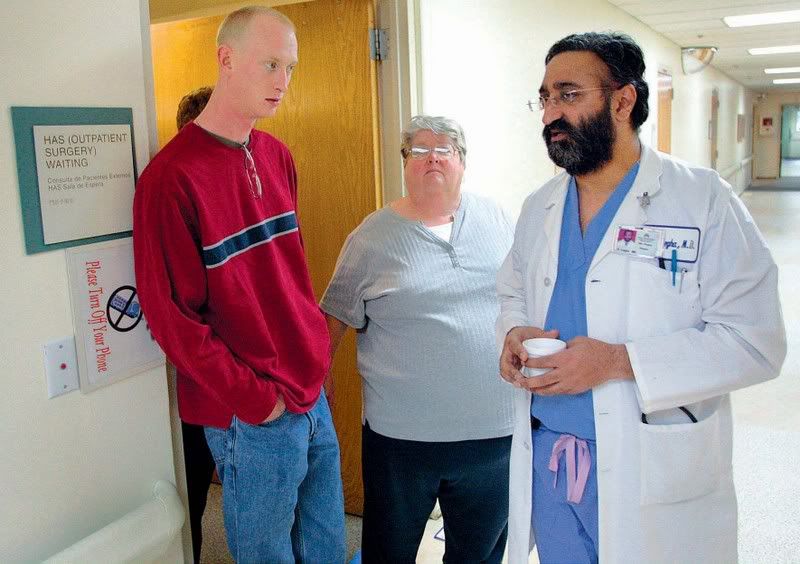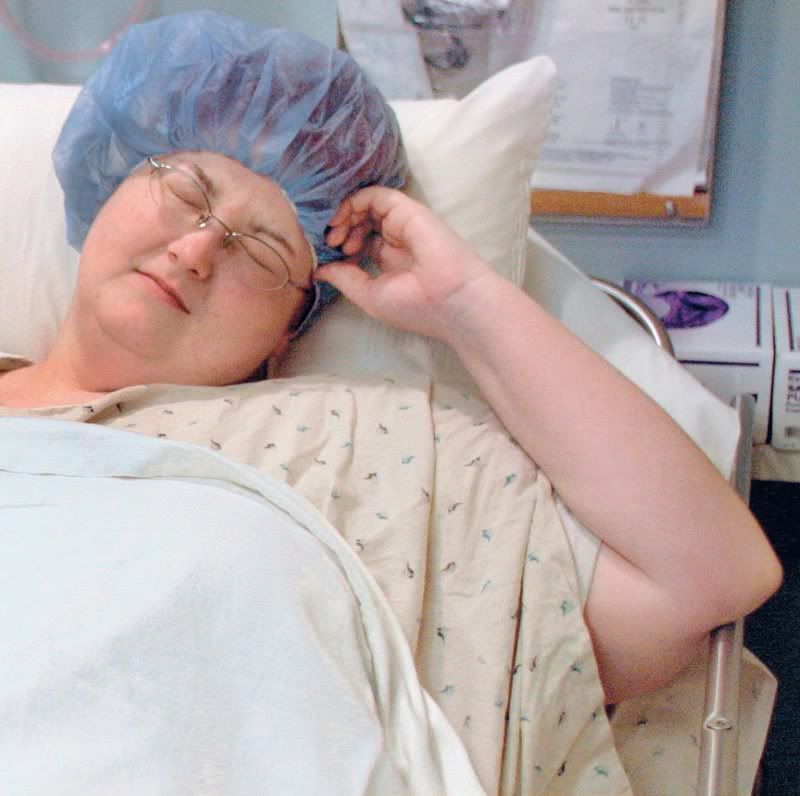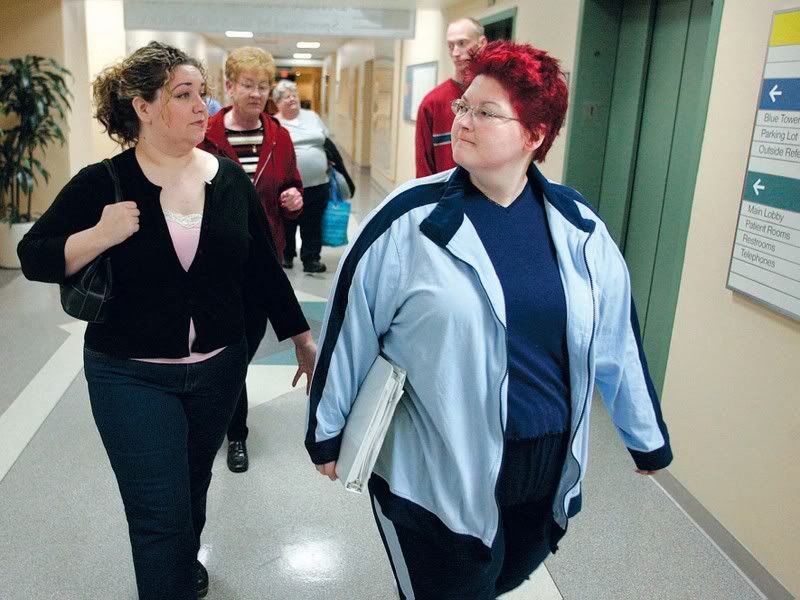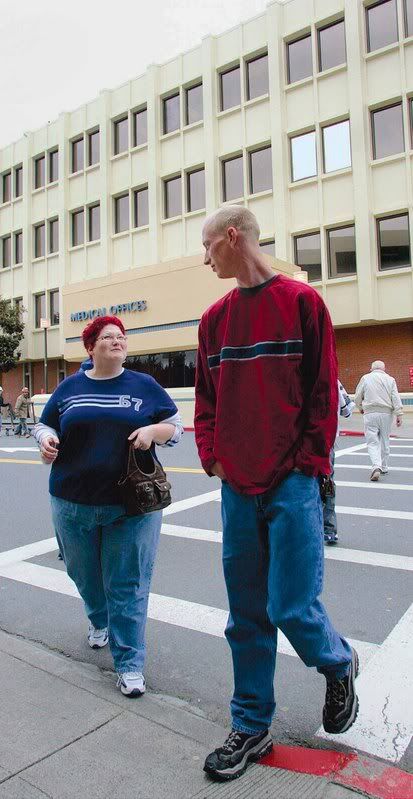



Originally published March 28, 2007, in the Tracy Press.
A couple of years ago, my husband and I stopped at a diner on Highway 132 for breakfast on the
way to Turlock. We were seated at a dinky table because I had outgrown the diner’s booths years before. Two tables over was a middle-aged couple. While I was perusing the menu, I couldn’t help but notice that the couple seemed to be talking about us. I ignored it, thinking it was just my insecurity.
My husband and I ordered our beverages and breakfast, and he excused himself for a moment.
He had been gone about five minutes when the man from the other table got up and approached me. He introduced himself and told me he had once been like me.
He had been gone about five minutes when the man from the other table got up and approached me. He introduced himself and told me he had once been like me.
Unsure of what he meant, I smiled and let him continue.
He told me he had recently undergone gastric-bypass
surgery and that it had changed his life. He encouraged
me to do the same. He said he had wasted too many
years of his life in an obese prison and that he couldn’t
bear to see someone as young as me do the same.
Shock treatment
Floored, I managed to stammer out some pleasant-sounding questions. Inside, I wasn’t sure if I should burst into tears or punch out his teeth. He told me he had been disabled and unable to walk or drive before the procedure.
He talked about having a new lease on life and feeling that God compelled him to talk to others he saw struggling with their weight. Not sure how to respond to such passion, I quietly thanked him for his time and cursed my husband for leaving the table. I was sure the man wouldn’t have had the nerve to approach me had he been there. But even if he had, my husband surely would have punched his teeth out.
The man and his wife left soon after our talk, and my husband came back to the table just as our food arrived. As I picked over my food, my emotions ran the gamut from anger to shock to despair to shock and back to anger. I tried to numb the emotions by eating the oversize platter of eggs, sausage and hash browns I was served. It didn’t work; instead, my stomach just started to hurt.
Finally, I told my husband. Though he took my side and said the man was either delusional or
just so happy with his own results that he couldn’t help his eagerness to share it with the world, the man’s words stuck.
just so happy with his own results that he couldn’t help his eagerness to share it with the world, the man’s words stuck.
It wasn’t something I ever said out loud, but I was miserable. The truth was that I was bloated and swollen and feeling like a stranger in my own body. But I didn’t know how to admit it.
Reality sinks in
About a year ago, as I sat on a cold exam table in a paper nightgown, my doctor told me I had obesity-related infertility.
About a year ago, as I sat on a cold exam table in a paper nightgown, my doctor told me I had obesity-related infertility.
I was crushed.
I fell into a depression. Not the kind of depression that’s diagnosed by doctors and medicated, but the kind that makes you hate everyone and everything and become a general pain to be around. My weight quickly jumped from 280 pounds up to 335, and I would bet I went as high as 345.
Finally, I began to consider surgical weight loss. It was one thing when the only miserable person was me, but now my husband was sad because we couldn’t have that family we wanted so badly.
Feb. 23
Tonight, the day before I have gastric-bypass surgery, it’s the man in the diner who is on my mind. I’ve been pretty stoic today, but my mind has gone a million miles a minute with the idea of going through with this.
Tonight, the day before I have gastric-bypass surgery, it’s the man in the diner who is on my mind. I’ve been pretty stoic today, but my mind has gone a million miles a minute with the idea of going through with this.
Everybody has a different way of coping with stress. I spend some time with family and friends, but I really crave time alone. I manage tonight to get about an hour of it. My husband, on the other hand, prefers a six pack of Corona to the company of friends or to being alone.
Once he returns to the room, the floodgates open. As we cuddle in bed, I begin to cry uncontrollably. As is typical for my man-of-few-words husband, he just holds me and hands me tissues at the appropriate times. Once my sobs quiet, he asks if I am OK.
I tell him I’m worried that I won’t be able to adjust to the lifestyle that this surgery
requires. I’m sure he thinks the comment was ridiculous. After all, I can tell from the look he’s worn all day that he is more worried about becoming a widower than anything else.
requires. I’m sure he thinks the comment was ridiculous. After all, I can tell from the look he’s worn all day that he is more worried about becoming a widower than anything else.
But he doesn’t mock me.
Instead, he responds with the type of comment that reminds me why I married him in the first place.
“You can do anything you set your mind to; this will be hard, but you’ve handled much more difficult challenges before. You’ll do great.”
And with that, we both fall asleep.
Feb. 24
It’s about 7:30 a.m., time to say goodbye to my family. Ihug my best friend, my husband, my mom and my mother- in-law, all of whom caravanned from the valley to South San Francisco.
It’s about 7:30 a.m., time to say goodbye to my family. Ihug my best friend, my husband, my mom and my mother- in-law, all of whom caravanned from the valley to South San Francisco.
I’m taken back into a large room with gurneys lined in rows that have curtains separating them.
Behind curtains, I’m told to remove all my clothing and put on thin socks, an extra-large hospital gown and a blue paper shower cap. I put all my belongings into a plastic bag that will be given to my husband when I’m sent in for surgery. They let me keep on my glasses until the last minute.
Behind curtains, I’m told to remove all my clothing and put on thin socks, an extra-large hospital gown and a blue paper shower cap. I put all my belongings into a plastic bag that will be given to my husband when I’m sent in for surgery. They let me keep on my glasses until the last minute.
I’m surprised at how cold the operating room is. I guess that’s one way to control a patient’s bleeding — operate in sub-zero temperatures. Once on the operating table, a pillow is put behind my head. My last memory is that of reaching back to adjust it.
Post-op
I wake up in ICU two hours later in terrible pain. I tell the nurse it feels as if I’ve been kicked by a cow. She doesn’t realize I’m speaking from experience.
I wake up in ICU two hours later in terrible pain. I tell the nurse it feels as if I’ve been kicked by a cow. She doesn’t realize I’m speaking from experience.
I’m asked my pain level, and I rate it a four out of 10. Actually, it’s an eight. I just can’t think clearly enough to make sense of the question at the moment.
The nurse asks if I want visitors, and I bark at her.
“I don’t want anybody to see me like this.”
She turns the lights on; I make her turn them off. She hands me a control to the morphine drip. She tells me that I’m already getting morphine in my IV, but that I can hit the button every 10 minutes for an extra gram. I squint at the clock because I don’t have my glasses. Fifteen minutes later, I open my eyes and press the button.
The nurse tries to point out everything in the room, but I tell her I can’t see without my glasses.
She asks if she can get my husband to bring them to me. I want to say no because I don’t want him to see me in pain, but I’m overcome by the need to see. I hit the button
again. It’s about 11 a.m.
She asks if she can get my husband to bring them to me. I want to say no because I don’t want him to see me in pain, but I’m overcome by the need to see. I hit the button
again. It’s about 11 a.m.
Find my husband
I manage to give the nurse a detailed description of my husband, “He’s really tall and really
blond, and please don’t call him Mr. Luiz. He hates that; we have different last names.”
I manage to give the nurse a detailed description of my husband, “He’s really tall and really
blond, and please don’t call him Mr. Luiz. He hates that; we have different last names.”
A few minutes later, I hear her talking to him.
“She’s doing great. She’s in a lot of pain, but she was alert enough to describe you to a tee.”
My husband walks in, kisses me and gives me my glasses. He looks like he hasn’t slept in days. I ask him if he’s been pacing.
“I think I took the floor down five inches,” he answers.
I tell him he looks worried; he says he feels better now. I tell him that I feel like I’ve been kicked by a cow. He laughs. He’s been kicked by a cow before, too.
The nurse asks if I’m ready for more visitors. The answer is still no. My husband leans close and says that my best friend and mom want to come in. My best friend, who drove from Modesto, won’t leave until she sees me. I agree to let her and my mom in because I don’t wantmy friend to hit traffic. I tell my husband to send them in.
“But tell them they can’t stay very long,” I call after him.
Anodyne and love
Right before my mom and best friend enter my room, I press the morphine button again. I don’t even look at the clock this time. I let them both hug me, and I tell them I’m fine, just in a little pain. My mom tries to rub my feet. I beg her not to touch me. I tell them I want to sleep and that I want to see my husband again. They leave, but more people are waiting to see me.
Right before my mom and best friend enter my room, I press the morphine button again. I don’t even look at the clock this time. I let them both hug me, and I tell them I’m fine, just in a little pain. My mom tries to rub my feet. I beg her not to touch me. I tell them I want to sleep and that I want to see my husband again. They leave, but more people are waiting to see me.
When Beau returns, I tell him how much I love him. I’m so tired. I tell him I really want to go to sleep. His mom still wants to come in, but she promises not to stay long. He tells me that I
can sleep after that, and he and my family will go to lunch. After my mother-in-law comes in and gives me a hug and a kiss, I fall asleep.
can sleep after that, and he and my family will go to lunch. After my mother-in-law comes in and gives me a hug and a kiss, I fall asleep.
The sleep isn’t incredibly restful. I’m intermittently interrupted by visits from the anesthesiologist, surgeon, health educator and other medical professionals I don’t remember. But when I wake up at 1:30 p.m., I feel like a new woman.
Four weeks later
I don’t feel like I’ve had major surgery. In fact, when I’m not eating, it’s easy to forget that anything has been done to my digestive system. But something has, and I’d be lying if I said it hasn’t been a major adjustment.
I don’t feel like I’ve had major surgery. In fact, when I’m not eating, it’s easy to forget that anything has been done to my digestive system. But something has, and I’d be lying if I said it hasn’t been a major adjustment.
Spontaneity is no longer in my vocabulary. Every time I plan to leave the house, I have to have an itinerary. I need to know how long I’ll be gone, where I’m going and how that will affect
mealtime. Most times, I pack an ice chest before I leave. Regardless of where the day takes me, it ensures I won’t have to worry about cutting my day short to forage for food. It also adds a good half hour of preparation to my day.
mealtime. Most times, I pack an ice chest before I leave. Regardless of where the day takes me, it ensures I won’t have to worry about cutting my day short to forage for food. It also adds a good half hour of preparation to my day.
I have to make sure the ice chest has foods I can eat that add up to 80 grams of protein — my daily requirement — in case I’m out past dinner. Of course, most of the food has to be ready to eat because I never know whether I’ll be somewhere with a microwave at my disposal.
A clockwork diet
Once the food situation is figured out, then I have to organize a travel pill box with my vitamins. I have to take a multivitamin twice a day, iron once a day and calcium six times a day. None of the vitamins can be taken with the others, and they also must be taken no fewer than two hours apart.
Once the food situation is figured out, then I have to organize a travel pill box with my vitamins. I have to take a multivitamin twice a day, iron once a day and calcium six times a day. None of the vitamins can be taken with the others, and they also must be taken no fewer than two hours apart.
Then, there is the water. Drinking 64 ounces of water isn’t easy anywhere — especially when the size of my mouth is more than double the size of my new pouch — but it’s even more difficult when traveling. I keep a stash of liter-size water bottles for traveling. I also keep extra bottles in the car, just in case I’m stranded somewhere.
After I’ve done all that, I check the clock. Let’s say it’s 10 a.m. Generally, I finish my breakfast at 8:30 a.m. That means I have to have lunch at 1:30 p.m. and dinner at 7 p.m. If, for some reason, I miss my mealtime by 30 minutes or an hour, my whole day will be thrown off.
I also have to plot my water consumption around my meals because I have to abstain from fluids for 10 minutes before a meal and for an hour afterward. That means I have 3½waking hours when I’m not allowed to consume fluids.
Aside from day-to-day logistics regarding meals, vitamins and water, I have to be diligent about getting my exercise. I have to admit, this and water consumption are my weakest areas. I’m still easily exhausted. I am not consuming more than 500 calories a day, and I’m trying to balance work and a personal life on that minimal amount of fuel.
Me first, by necessity
When I overdo it and get exhausted, exercise suffers. At the moment, I need 10 hours of sleep just to function. Before surgery, I easily operated on four . If I don’t get 10 hours now, it’s very hard to get out of bed in the morning for work, much less to go tothe gym. However, that’s no excuse.
When I overdo it and get exhausted, exercise suffers. At the moment, I need 10 hours of sleep just to function. Before surgery, I easily operated on four . If I don’t get 10 hours now, it’s very hard to get out of bed in the morning for work, much less to go tothe gym. However, that’s no excuse.
My husband reminds me that
gastric bypass forces a person to put him or herself first. And that getting enough exercise is one of the main ways I can focus on myself. I’m lucky to have him for a reality check.
gastric bypass forces a person to put him or herself first. And that getting enough exercise is one of the main ways I can focus on myself. I’m lucky to have him for a reality check.
In the past four weeks, I have lost 30 pounds. Not too bad, if I say so myself. But, I’d be lying if I said I’m not still self-critical. I know a few people who weighed the same amount as me before surgery, and they dropped 50 pounds the first month. It’s hard not to compare
myself to them. But part of the reason I had this surgery is that I’m not typical.
myself to them. But part of the reason I had this surgery is that I’m not typical.
My body has never responded well to weight-loss programs, so I don’t know why it surprises me that it would be slower than most to lose weight after bypass surgery. If anything, I can say every day is a lesson for me. I’m more in tune with my body than ever before. And though the adjustment hasn’t happened overnight, the fact that it has happened at all amazes me.